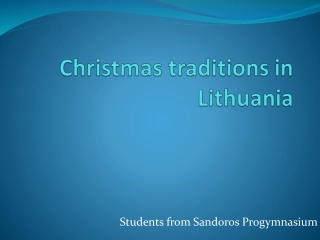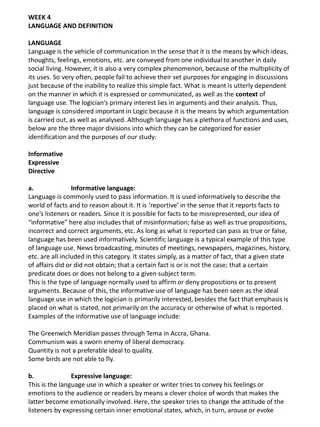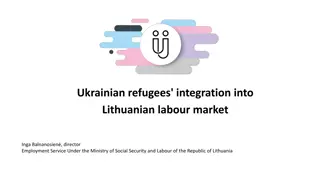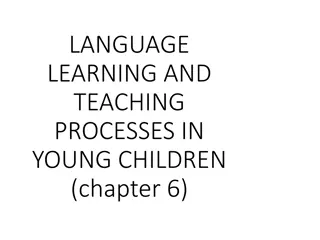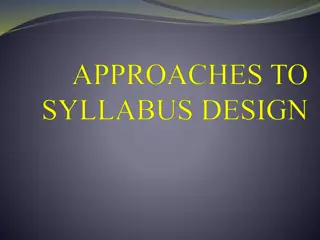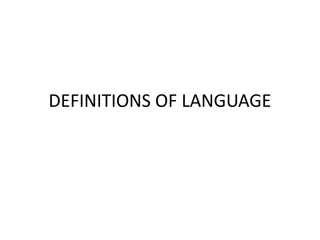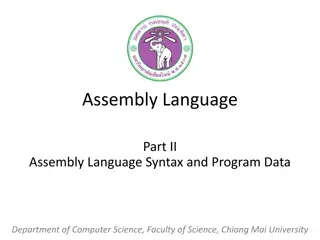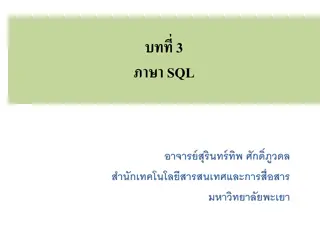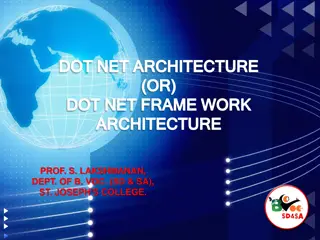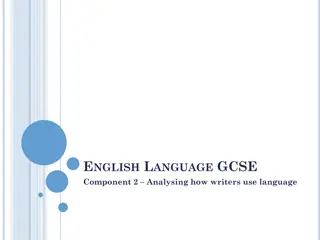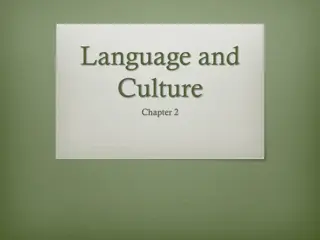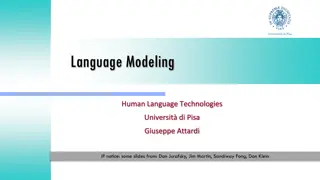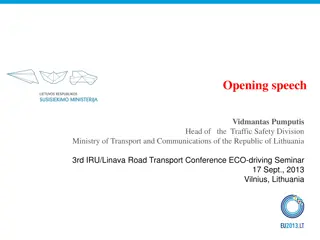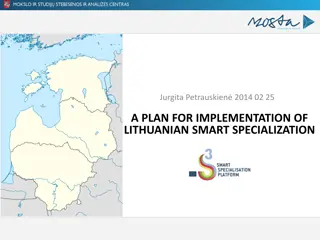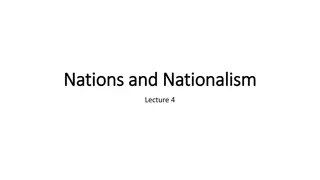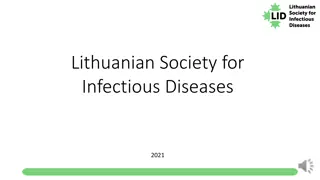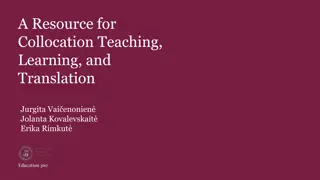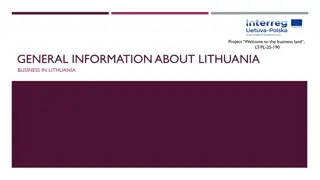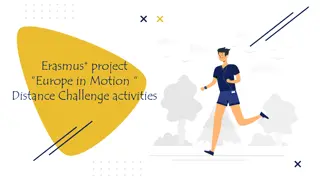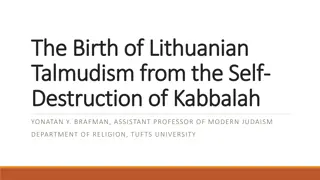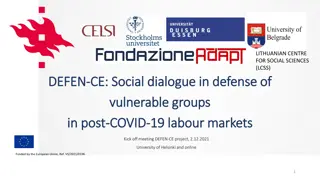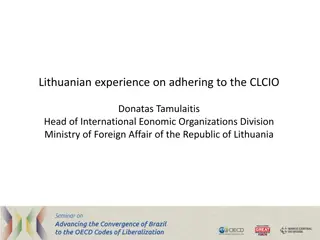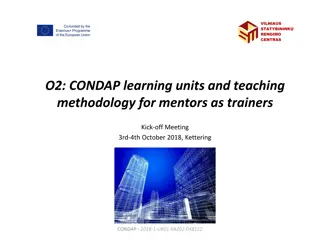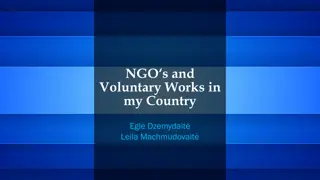Lithuanian Christmas Traditions: Celebrating Kūčios and More
Discover the unique Lithuanian Christmas traditions, where Christmas Eve (Kūčios) holds greater significance than Christmas Day. From decorating the Christmas tree to enjoying a traditional meal of 12 dishes, such as fish and kūčiukai pastries, to commemorating the dead and indulging in homemade
0 views • 12 slides
Career Opportunities and Challenges in Translation & Interpreting Pedagogy Post-Pandemic
The APTIS 2022 conference explores new avenues in Translation and Interpreting (T&I) pedagogy amidst a changing landscape. Dr. Bego A. Rodriguez highlights emerging roles for T&I graduates. The context reveals a decline in language learning in the UK, impacting the Language Service Industry. The UK'
0 views • 13 slides
Language Study Community – Enhance Your Language Skills
Joining a Language Study Group is a fantastic way to take your language learning to the next level. By leveraging the power of Group Study, you can immerse yourself in the language, enhance your understanding, and build confidence in your speaking abilities. Read full article \/\/explainlearning.com
1 views • 3 slides
Academic Language Demands and Supports in Instructional Planning
Academic Language Demands and Supports are crucial in educational settings to ensure comprehension and usage of language by students. This content discusses embedding language demands in lesson plans, providing language supports, and peer review activities to enhance academic language skills. The fo
6 views • 10 slides
The Significance of Media in Language Learning
Media plays a crucial role in language learning by raising awareness of the ideology behind linguistic structures and providing valuable information on society and culture. Linguists are drawn to media language for research purposes and to understand its impact on language use and attitudes. Media s
11 views • 5 slides
Understanding Translation: Key Concepts and Definitions
Translation involves transferring written text from one language to another, while interpreting deals with oral communication. Etymologically, the term "translation" comes from Latin meaning "to carry over." It is a process of replacing an original text with another in a different language. Translat
11 views • 76 slides
Language and Communication in Society: Understanding Interactions
Explore the intricate relationship between language and society through lectures focusing on language in interaction, power dynamics, language contact and change, public space discourse, linguistic landscaping, and more. Delve into the shift from structural linguistics to societal communication, red
6 views • 28 slides
Understanding Language: Informative, Expressive, and Directive Uses
Language serves as a vital medium for communication, allowing the conveyance of ideas, thoughts, and emotions. It is a complex phenomenon with diverse uses. This text delves into the three major divisions of language use - informative, expressive, and directive. Informative language conveys facts, w
3 views • 6 slides
Challenges and Integration of Ukrainian Refugees into Lithuanian Labour Market
Ukrainian refugees face various social and professional barriers while integrating into the Lithuanian labour market, including lack of language skills, accommodation issues, health problems, and challenges in diploma recognition. They work in different sectors, with a significant number in transpor
5 views • 8 slides
Language Learning and Teaching Processes in Young Children
Development of language in young children is influenced by various factors such as their cultural and linguistic environment, unique characteristics, and interactions with adults. Optimal language development requires language stimulation from the environment. Varied cultural practices impact langua
1 views • 51 slides
Understanding Language in Stoicism: Significance and Corporeality
Language in Stoicism plays a crucial role in the process of assenting to impressions by focusing on corporeality, reason, and truth. It distinguishes between the mundane vocal sounds, articulated speech, and significant language to convey meanings effectively. The significance of language lies not i
0 views • 13 slides
Understanding Language Teaching Syllabus: Integration, Theory, and Approaches
Language Teaching Syllabus involves the integration of subject matter and linguistic elements, guided by theories of language and learning. Various approaches like Grammatical, Situational, Communicative, and Analytic are used to structure syllabi. Breaking language into parts aids in sequential lea
1 views • 28 slides
Exploring Language and Communication Through a Short Film
In this lesson, students will watch a 10-minute short film titled "The Most Beautiful Thing" by Cameron Covell. They will reflect on the value of learning another language, analyze how facial expressions and body language convey emotions, and develop empathy towards those facing language barriers or
0 views • 29 slides
Various Definitions of Language Throughout Linguistic History
Different linguists and scholars have offered various definitions of language over time. Sapir (1921) emphasized language as a method of communicating ideas, emotions, and desires through voluntary symbols. Bloch and Trager (1942) focused on the social aspect of language as a system of vocal symbols
1 views • 12 slides
Introduction to Assembly Language Syntax and Program Data
Learn about the syntax of assembly language and how data, variables, and constants are used in programming. Explore the basic instructions and the translation of high-level language into assembly language. Discover the role of an assembler in translating assembly language programs into machine langu
3 views • 36 slides
Enhancing Language Learning Across the Curriculum in B.Ed. 1st Year Course
Language Across the Curriculum (LAC) emphasizes that language learning should occur across all subjects, not just in language classrooms. It highlights the importance of incorporating language development into every learning activity, fostering multilingualism in schools. Language plays a crucial ro
2 views • 34 slides
Understanding First Language Acquisition Process
First language acquisition is the process through which humans develop the capacity to perceive, comprehend, and effectively use language to communicate. It primarily focuses on infants acquiring their native language. Basic requirements, caregiver speech features, and the acquisition schedule play
0 views • 19 slides
Comprehensive Overview of SQL Commands and Language Categories
In this detailed guide, you will learn about Structured Query Language (SQL) including its various commands such as Data Definition Language (DDL), Data Manipulation Language (DML), Data Control Language (DCL), and Transaction Control Language (TCL). Explore how SQL is used in Database Management Sy
0 views • 15 slides
Speech and Language Developmental Milestones: A Bilingual/Multilingual Perspective
Speech and language developmental milestones are crucial for children, regardless of their home language. These milestones encompass receptive language, expressive language, pragmatics, and articulation and phonology. Understanding how a child hears and talks from birth to one year is essential, as
1 views • 23 slides
Understanding .NET Framework Architecture and Common Language Runtime
This content delves into the intricacies of .NET architecture, highlighting its structure, common language runtime, and key components such as Common Type System (CTS) and Common Language System (CLS). It explains how .NET supports multiple languages, facilitates cross-language interoperability, and
0 views • 13 slides
Analyzing Writer's Language Use in English Language GCSE Component 2
In English Language GCSE Component 2, students learn to analyze how writers use language. The learning objective focuses on commenting, explaining, and analyzing language use with relevant subject terminology. The exam assesses students on their ability to interpret and explain a writer's thoughts,
0 views • 12 slides
Building Engineering Systems Overview
Explore the standards, requirements, and parameters for building engineering systems, focusing on indoor microclimate conditions, energy efficiency, and optimal parameters for different seasons. Learn about European and Lithuanian standards, as well as specific parameters for school classrooms. Refe
0 views • 8 slides
Language and Culture Reflections: Diversity in Linguistic Emphasis
Exploring the correlation between language and culture, this content delves into how various languages reflect cultural values and priorities. Through examples like the Inuit language with rich vocabulary for snow and seals, the Shinzwani culture's unique word for mother and aunt, and the evolving l
0 views • 50 slides
Understanding Language Modeling in Human Language Technologies
Exploring the concepts of language modeling in human language technologies, this presentation delves into N-grams, the chain rule of probability, evaluation metrics like perplexity, smoothing techniques such as Laplace, and the goal of assigning probabilities to sentences. It covers applications lik
1 views • 81 slides
Introduction to Language Technologies at Jožef Stefan International Postgraduate School
This module on Knowledge Technologies at Jožef Stefan International Postgraduate School explores various aspects of Language Technologies, including Computational Linguistics, Natural Language Processing, and Human Language Technologies. The course covers computer processing of natural language, ap
0 views • 27 slides
Strategies for Cost-Efficient Fuel Management in Road Cargo Companies
Explore strategies presented at the ECO-driving Seminar in Lithuania for reducing fuel expenses in road cargo companies, including strict fuel usage controls in trucks and eco-driving courses for drivers. The Lithuanian transport system's priorities, such as the 4th Rail package and clean power for
0 views • 10 slides
Exploring Sociolinguistics: Language Variation and Social Factors
Sociolinguistics delves into the study of language variation influenced by social factors, examining the relationship between language and its social context. It explores various aspects like standard pronunciation, language choice, speech acts, language components, language variety, and factors suc
0 views • 73 slides
Implementation Plan for Lithuanian Smart Specialization
Plan for Lithuanian Smart Specialization involves the MOSTA institution providing recommendations, organizing monitoring, and analyzing the national research and higher education system. The plan includes analysis, expert panels, roadmaps, consultation with experts, instrument pool, and monitoring s
0 views • 5 slides
Understanding Assembly Language Programming for Computing Layers
Assembly language is a low-level programming language that enables direct interaction with a computer's hardware components. This content explores the fundamentals of assembly language, the relationship between human-readable machine language and binary code, an assembly language program for multipl
0 views • 31 slides
Understanding Nations, Nationalism, and Their Emergence: A Comprehensive Overview
Explore the concept of nationhood, the evolution of nationalism, and the intricate relationship between cultural and political identities. Delve into the emergence of nations, the definition of a nation, and the complexities of cultural nations. Uncover historical examples, such as the Polish-Lithua
0 views • 15 slides
Understanding Language Anxiety in Foreign Language Learning and Teaching
Explore the impact of language anxiety on students and teachers in foreign language learning and teaching contexts through insights from Dr. Christina Gkonou's research. Delve into the theoretical background, implications for language education, and real-life experiences shared at the Essex Language
0 views • 25 slides
Lithuanian Society for Infectious Diseases: Advancing Infectious Diseases Diagnostics, Treatment, and Prevention
Lithuanian Society for Infectious Diseases is a non-profit organization in Lithuania that brings together healthcare professionals to improve the diagnosis, treatment, and prevention of infectious diseases. They participate in various initiatives, events, and collaborations, organize conferences, an
0 views • 7 slides
A Resource for Collocation Teaching, Learning, and Translation in Lithuanian
This resource focuses on collocations in Lithuanian, covering topics such as identification and selection of collocations, cross-cultural language variation, translation issues, and available language resources and tools. It offers materials for language teaching, translation studies, and linguistic
0 views • 16 slides
Comprehensive Overview of Business Environment in Lithuania
Lithuania, with an area of 650,200 sq. km, is a country rich in history and culture. It is known for its religious population, with around 79% Roman Catholics. The official language is Lithuanian, and the currency is Euro. The political system is a parliamentary democracy, and the country is divided
0 views • 18 slides
Erasmus+ Project: Europe in Motion Distance Challenge Activities
Participate in the Erasmus+ project "Europe in Motion Distance Challenge" where Lithuanian students engage in various physical activities such as running, walking, and cycling as part of their PE lessons. Explore the integration of these activities and the adventurous DofE hike where participants wa
0 views • 9 slides
The Birth of Lithuanian Talmudism: Destruction of Kabbalah
Birth of Lithuanian Talmudism from self-destruction of Kabbalah explored by Yonatan Y. Brafman, highlighting the impact of conceptualizing Halakhah on modern Judaism. The discourse of modernity and Jewish law's role in continuity or discontinuity are examined through an overview setting the stage fo
0 views • 23 slides
Social Dialogue in Defense of Vulnerable Groups in Post-COVID-19 Labour Markets
The Lithuanian Centre for Social Sciences (LCSS) is hosting the DEFEN-CE project kickoff meeting at the University of Helsinki, focusing on social dialogue in defense of vulnerable groups in post-COVID-19 labor markets. The project aims to explore the role of social dialogue in addressing employment
0 views • 33 slides
Lithuanian Journey Towards OECD Accession: Key Coordination Efforts
Lithuanian's experience in adhering to the CLCIO, coordinated by Donatas Tamulaitis, focuses on various processes including OECD accession, communication with Member states, management of recommendations, and more. The journey started in 2014 with the initial list of reservations and progressed thro
0 views • 14 slides
CONDAP Learning Units and Teaching Methodology for Mentors
Develop innovative pedagogical orientations and curriculum for in-company mentors in digital construction. Define learning units based on apprenticeship mentors' digital skills needs. Activities include clustering learning outcomes, developing modules, and integrating courses into training programs.
0 views • 8 slides
NGO Initiatives in Lithuania: Order of Malta and POLA Coalition
Non-governmental organizations (NGOs) play a vital role in Lithuania, with initiatives like the Order of Malta focusing on humanitarian aid globally and the POLA Lithuanian Cancer Patient Coalition providing support to cancer patients and families. These NGOs work towards social and medical goals, o
0 views • 17 slides
